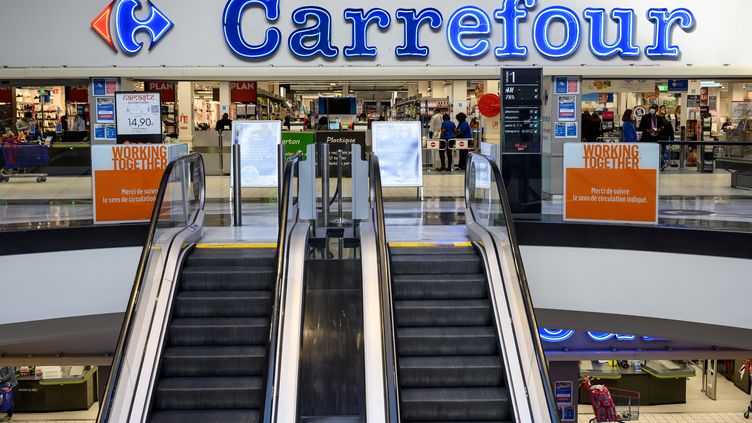(BFM Bourse) – The British bank believes that the company presents a good story to the market at an attractive price. Cost reductions and the shift towards private labels are all strengths for the group at a time when mass distribution is entering a phase of disinflation.
Carrefour is not really at the head of the CAC 40. Since the start of the year, the mass distribution group’s shares have gained 3% when the Parisian index has advanced 8.9% over the same period. Even if it should be noted that the company led by Alexandre Bompard had limited the damage last year (-2.9% when the CAC 40 had lost 9.5%).
Perhaps, however, the best is yet to come. In any case, this is what the HSBC bank thinks in a note published on Thursday and in which the establishment reiterated its buying opinion and its price target of 22 euros. This allowed Carrefour shares to gain 1% on Thursday, with the title gaining another 0.2% this Friday to 16.09 euros.
Certainly, Carrefour has recently seen its market share crumble in France, according to the three most recent editions of the ranking established by Kantar Worldpanel, due to the good momentum of Leclerc. But for the bank, this does not mark a trend, especially since the net promoter score (NPS), an indicator used to measure customer satisfaction and loyalty, “shows no sign of deterioration, which is reassuring,” she judges.
>> Access our exclusive graphic analyses, and gain insight into the Trading Portfolio
MDD, “strategic weapons”
As soaring food prices appear to have peaked, the sector is heading towards “disinflation” (a flattening of inflation) rather than deflation (falling prices). HSBC therefore expects food price inflation to reach 8-9% at the end of the year (compared to 9.6% in September), then between 2% and 5% in 2024.
“We do not expect deflation, as the level of energy costs and Brent remains high, which will have an impact on suppliers, and contribute to modest food inflation,” explains the bank.
In this context, Carrefour “is in a good position to face disinflation”, she considers. “As competition intensifies and pressure on purchasing power increases, it is increasingly important for Carrefour to focus on price, value and quality (especially for private labels) as key elements of its strategy,” she judges.
One of Carrefour’s trump cards remains its distributor brands, which are intended to gain momentum. These brands represented 33% of the company’s food sales in 2022, 35% in the first half, and the group is targeting a figure of 40% in 2026. But HSBC believes the group can go even further.
This proves to be decisive insofar as these brands offer multiple advantages for distributors. “Private brands are strategic weapons in terms of differentiation and loyalty and are key tools for improving brand and price image. They offer much greater room for maneuver to reduce prices, whereas private labels national brands need time to catch up,” says HSBC.
Carrefour has recently strengthened its offering, particularly at the entry level, with the Simpl and Classic brands, which have gained market share and display prices between 6% and 10% lower than Lidl products while being more visible in rays.
Brazil will turn into a favorable wind
Another asset up Carrefour’s sleeve: its cost reduction program, with 4 billion euros which must be saved over the period 2023-2026. This notably via the rise in power of its purchasing centers at the European level, the acceleration of the franchise model in its stores (90% of new openings will be under franchise, underlines HSBC) or even by crystallizing the value of its assets real estate.
Which should make it possible, according to the bank, to increase the operating margin in France by 20 basis points (0.2%) in France this year to 2.4%.
Outside of France, HSBC considers that Brazil (a country which represents more than 20% of the group’s sales), should constitute a “window” for the action from the third quarter. This is because the significant integration costs (such as store conversions) linked to the acquisition of Grupo Big, acquired last year by Carrefour Brazil, are now a thing of the past. The company’s profitability in the Portuguese-speaking country should therefore recover, with HSBC anticipating an operating margin of 5.4% in the second half of 2023, an increase of 100 basis points over one year.
In the end, Carrefour presents an “equity story”, that is to say the story that a company tells the market to please it, “attractive” at “a low price”, the share trading at a discount by around 30% compared to its long-term average.
Julien Marion – ©2023 BFM Bourse
Are you following this action?
Receive all the information on CARREFOUR in real time:
